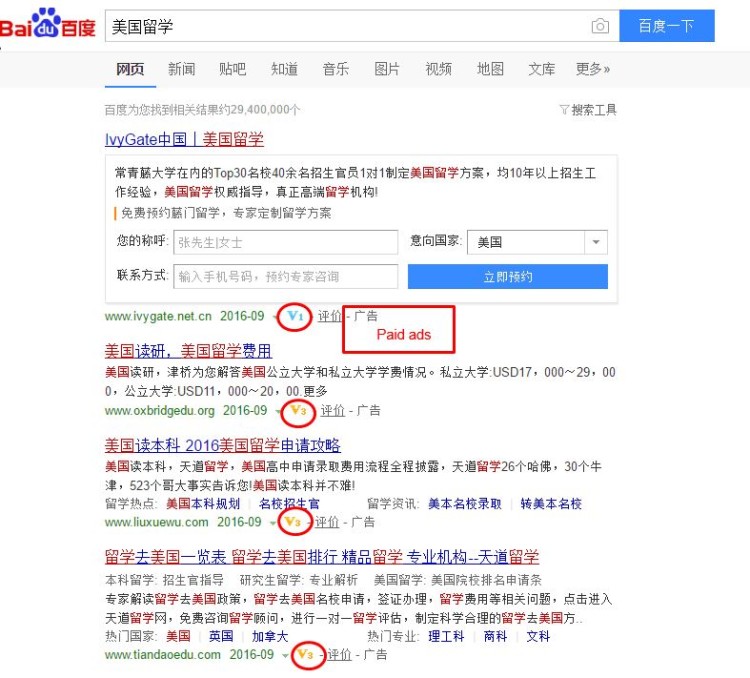Paid search is a great place to start your market entry as it can produce short-term results for a fixed budget. Where content marketing and SEO efforts may take months to get results, PPC will give you an instant flavour of the demand for your products in new international markets. Google and other search engines have a wide range of support for advertising in additional languages.
However, limiting your global paid search activities to only Google could severely restrict the exposure of your ads, your website traffic, and ultimately your company’s revenue, especially when it comes to certain countries. In different locations, the popularity of search engines varies significantly.
Selecting your platforms
Among PPC providers, Google AdWords and Microsoft’s Bing Ads are the two largest network operators, and both operate under a bid-based model.
Depending on the market, there may be alternative advertising platforms, which will need to be used in place of, or in addition to AdWords and Bing Ads. For example, in Russia, Yandex is the most relevant platform, while in mainland China, Google is blocked and the market is led by Baidu and 360 Search (so.com). The screenshot below illustrates how Baidu differentiates ads from organic results, and the V1, V2, V3 label shows how long a business has been advertising on Baidu (V3 indicating a longer length of time).

In South Korea, Naver caters for most searches, while in the Czech Republic, Seznam is frequently used, but Google is gaining in popularity, so here a combination of ad campaigns present on Google and Seznam is recommended. In Japan, Yahoo Japan is the leading search engine, closely followed by Google.
As you may have expected however, Google is the top search engine in all but six of the top global markets (and generally by a very substantial margin).
There are many considerations to make when planning international paid search campaigns. It is always worth familiarising yourself with the markets you are looking to advertise in as each market will be slightly different in terms of how users respond. You can check out our blog post on researching new markets to help you find the best opportunities for your business.
Here are some initial considerations to make before entering a new market:
Which devices users will be searching on
Many developing markets are accessing the internet much more on mobile devices, largely due to the increasing penetration of smartphones worldwide.
For example in 2017, 75% of Chinese internet users more often use a smartphone over a computer, closely followed by India at 72%, and South Africa at 69%. However, 32% of UK and 35% of US internet users prefer to go online using their smartphones, perhaps due to sharing internet usage across multiple devices. (figures from Consumer Barometer).
Landing pages and localisation
A major consideration must be how you present your company online in your target market’s language. The cons of not having a language ready website is explored in our blog posts on translation and localisation but is also highly relevant for paid search campaigns. Failure to localise the language for a campaign can result in a high bounce rate and wasted budget. If you cannot afford to fully localise your website, consider using a localised landing page or microsite. Visit our sister company’s website, Translation Laboratory, for more information regarding translation and localisation.
Small tweaks to landing pages can make a significant difference to your conversion rate from paid campaigns. Impeccable online customer experience must always be the goal, whether that involves only subtle adjustments, such as switching from British to American English, or more fundamental changes to accommodate a unique audience.
For a successful PPC campaign, the following three elements need to be present
- A well thought-out setup for a successful launch
- Ongoing optimisation and testing to ensure you are doing everything to maximise performance
- ROI focused budgeting and strategic bid management decisions
When developing a paid search campaign, creating keywords and ads in native language will signal to your audience that your campaign is relevant to their needs. It also makes your campaign more competitive with local rivals, who are building and maintaining paid search in the local language. If you have opted for developing a PPC campaign in your audience’s preferred language, but kept the website in English to save costs, you will inevitably have a higher bounce rate and poorer conversion rates compared to websites which have been localised. This not only leads to poor sales but may also damage the quality score of your keywords and thereby reduce your visibility.
Since many of the alternative ad networks are not the most straightforward to set up new campaigns with, it is often recommended to try advertising on Google first in different languages and territories, and use the results from that to inform further campaigns on the native platforms.
Given the additional difficulties of the language barrier caused by the basic navigability of some of these sites and the lack of English support, you will generally be better off working with a linguist or a specialist agency with knowledge of these platforms than going it alone.
Campaign structure
If a campaign is successful in the English market, the next step is often to replicate this ad structure and keyword choice in your international paid search campaigns to gain equal success.
While the theory seems logical, the reality of this tactic is very different. The keyword choices for the English campaign are likely to be the most profitable ones for an English audience, but are usually not transferable. For example, the length of an ad always needs to be considered, so for a language like German, simply translating the English ad will lead to too many characters – localisation is key.
Even if you factor language into your campaign and get a professional agency to directly translate your optimised keywords, these translated keywords do not take actual search volume in the market or profitability of a keyword into consideration. Nor do they consider semantic nuances which could make you decide to drop certain keywords or phrases that might not make sense in your new market.
When it comes to an international paid search campaign, the best practice is to look at the English campaign as a point of reference, but to ultimately build your international campaign from the ground up. This will enable you to gain the most relevant and profitable keywords for your campaign.
Best practice differs
While keyword selection is crucial, ad texts should also be given careful consideration. An engaging ad text encourages the audience to complete the call to action, however, best practice varies between markets. In most English campaigns, it is best practice to capitalise the first letter of each of the principle words in an ad text, but in France, it is the opposite and an ad written in title case could be viewed as bordering on spam, thus damaging the click-through rate.
The tone of your message and choice of wording can also play a key role. Again in most English campaigns, it is common practice to have some straight-forward calls to action which are often based on buying opportunities. Such strong calls to action are seen as too pushy in most European markets and your campaigns are less likely to gain clicks if the tone of the ads are not adapted to the market. This is why localisation is essential for ads, as you can see in the example below. In the German ad, different payment options are listed, as this is crucial information for a German audience. However, in the UK version, there’s no mention of payment options as it’s not something that this market needs to know before navigating to a website.


Optimise and test
One of the appeals of a paid search campaign is the chance to continuously run testing, using the outcomes to ultimately improve results. This competitive testing requires ongoing maintenance of your campaign, not only including regular analysis of ad performances, but also reviewing the actual search terms that have brought traffic to the site to ensure that quality is high, and budget is not being wasted on unprofitable areas.
While this is common practice for paid search campaigns, international campaigns add the complexity of language and understanding of the cultural differences, which affect best practices for advert writing.
Resourcing translation support every time your paid search campaign requires maintenance is not cost-effective, and a translation agency will not necessarily pick up on any missed opportunities due to the search habits of the target audience.
Having the option of maintaining your international paid search campaigns with someone who has the language resources and the digital skills required for the ongoing maintenance, can make your international campaign easier to manage and gives you one point of call rather than several different
agencies to support with the different elements (language and digital opportunities) of your campaign.
Strategically using PPC insight
Utilising a contained PPC campaign can help inform the selection of search terms that are used in the ‘natural’ SEO strategy for that market. PPC campaigns can be used as exploratory tactics to test the effectiveness of potential keywords, the most potent of which can be built into your corresponding SEO campaign.
To get the most out of your own international paid search campaigns, please get in touch and we will be happy to help.


